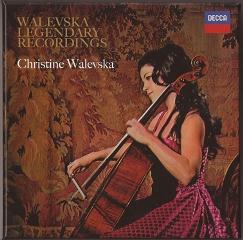Christine Walevska - Legendary Recordings CD2 (2010)
Christine Walevska - Legendary Recordings CD2 (2010)

1. 01 Dvořak- Cello Concerto In B Minor, Op. 104 15:26 2. 02 Dvořak- Cello Concerto In B Minor, Op. 104 11:15 3. 03 Dvořak- Cello Concerto In B Minor, Op. 104 13:08 4. 04 Haydn- Cello Concerto In C Major, Hob. VII B-1 10:40 5. 05 Haydn- Cello Concerto In C Major, Hob. VII B-1 9:27 6. 06 Haydn- Cello Concerto In C Major, Hob. VII B-1 8:11 Christine Walevska - cello London Philharmonic Orchestra Alexander Gibson – conductor (1-3) English Chamber Orchestra Edo de Waart – conductor (4-6)
Christine Walewska (sometimes spelled Walevska) was born in 1945 in Los Angeles into a musical family. Her mother played the violin, and her father was an antique violin dealer. Thus, she had the good fortune to begin her cello lessons on a small Bernadel. She took her first cello lessons from her father, at the age of eight or nine. By the age of thirteen she was studying with Gregor Piatigorsky and performing the Saint-Saens Concerto publicly with the National Symphony Orchestra of Washington, DC. When she was sixteen she joined Maurice Marechal's class at the Paris Conservatoire, where she became the first American to win first prize in both cello and chamber music. Before the competion (in which she performed a Haydn concerto) Marechal said to her: "Christine, play as you feel. If passages are written piano but you want to play them forte, without hesitation play them in the way your intuition prompts you. Play surrendering yourself wholly to the music you are performing, and with much liberty." (Quoted in Dr. Lev Ginsburg's History of the Violoncello.)
Two years later she began a successful global career as a concert artist. She has also made several recordings, including the first recording of the Saint-Saens D Minor Concerto. She recorded much of the standard cello concerto literature in Europe on the Philips label in the 1970's. She played the Brahms Double Concerto with the famed violinist, Henryk Szeryng. However, at the age of eighteen she toured South America, and fell in love with Argentina. She performed there at the Teatro Colon in Buenos Aires, and then all over South America. She married and settled in Buenos Aires. She was the first American artist to perform in Cuba under the Castro regime, and she was well-received in Havana and in the Cuban provinces. Castro was unable to attend her initial performances, but visited her later to personally convey his thanks.
Ginsburg heard Walewska perform at the Prague Spring Festival in 1975 in both a solo recital, and a symphony concert. He wrote: "What is attractive about Walevska's playing is its vivid artistic individuality, the musicality of the phrasing, temperamental interpretation and virtuoso technique. Critics compare her to Emanuel Feuermann and call her 'Piatigorsky's successor.'"
Walewska with Dr. Herbert AxelrodWalewska also studied with the great cellist Bolognini (of whom Casals remarked "Bolognini! The greatest cello talent I ever hear in my life!" and of whom Feuermann spoke: "For my money, the world's greatest cellist is not Casals, Piatigorsky or myself, but Bolognini!"). Bolognini composed a suite of six pieces in which the cello is played in the style of the flamenco guitar, the Serenata del Gaucho, and dedicated the composition to Walewska. Piatigorsky and other cellists have attempted to gain permission to perform the Serenata, but Bolognini dedicated them and left them to her on the condition that she never give the music to anyone else. She has honored his wishes, and is still the sole possessor of the manuscript. She regulary performs the piece as a stunning encore.
In the '90s Walewska and her husband moved to New York to a 5th Avenue residence, after living in Argentina for 12 years. She is at the height of her artistic powers, and still performs from time to time, though she has not sought public acclaim. In 1998 she gave a recital for the New York Cello Society, where she was great admired. Her interpretation of the Dvorak B Minor Concerto is considered by some to be the finest of any living artist. Fabio Uccelli wrote:
"Among the many recorded performances of this Concerto available, one struck this author as being close in spirit to the deeply rooted meanings we have attempted to reveal here.
"The performance in question is that by Christine Walewska with the London Philharmonic Orchestra conducted by Alexander Gibson and released in 1971. Was it her feminine sensitivity that captured the most intimate motivations underlying the work, unconsciously? We have rarely heard the equal.
"Here we will attempt a comparison with the performance by Mstislav Rostropovich (perhaps the greatest living cellist) and the Royal Philharmonic Orchestra conducted by Sir Adrian Boult and released in 1979.
"Generally speaking Mme. Walewska performs the Concerto with a great sense of humility, though also with pathos and vigour when necessary. Her instrument (a Bergonzi 1740) has a veiled, dramatic, but also celestial sound. It can express deep sobs and moments of high spiritual intensity, without confusing timbres. The instrument responds perfectly to the various emotional demands from the soloist." ---cello.org
download (mp3 @320 kbs):
yandex 4shared mega mediafire zalivalka cloudmailru uplea
